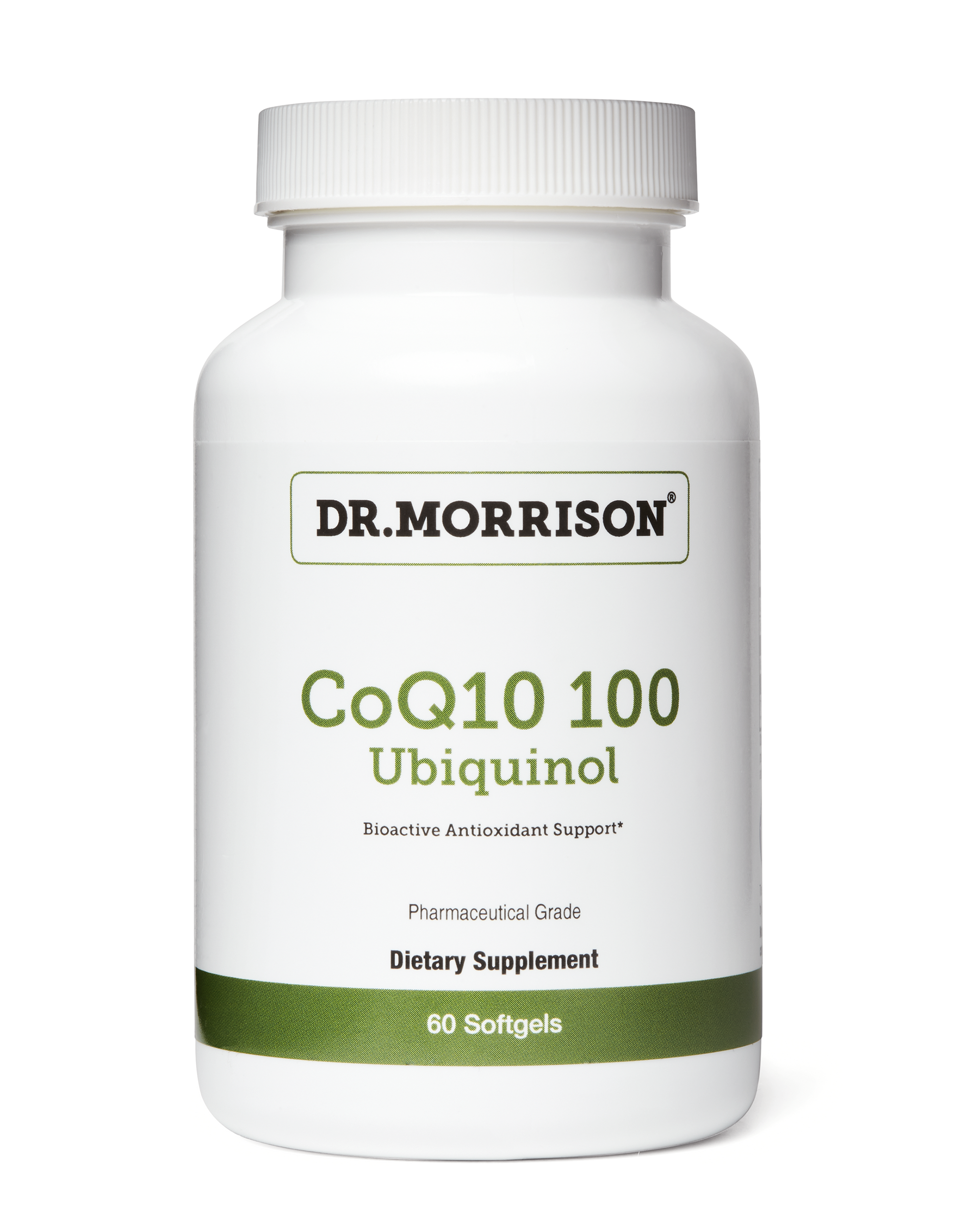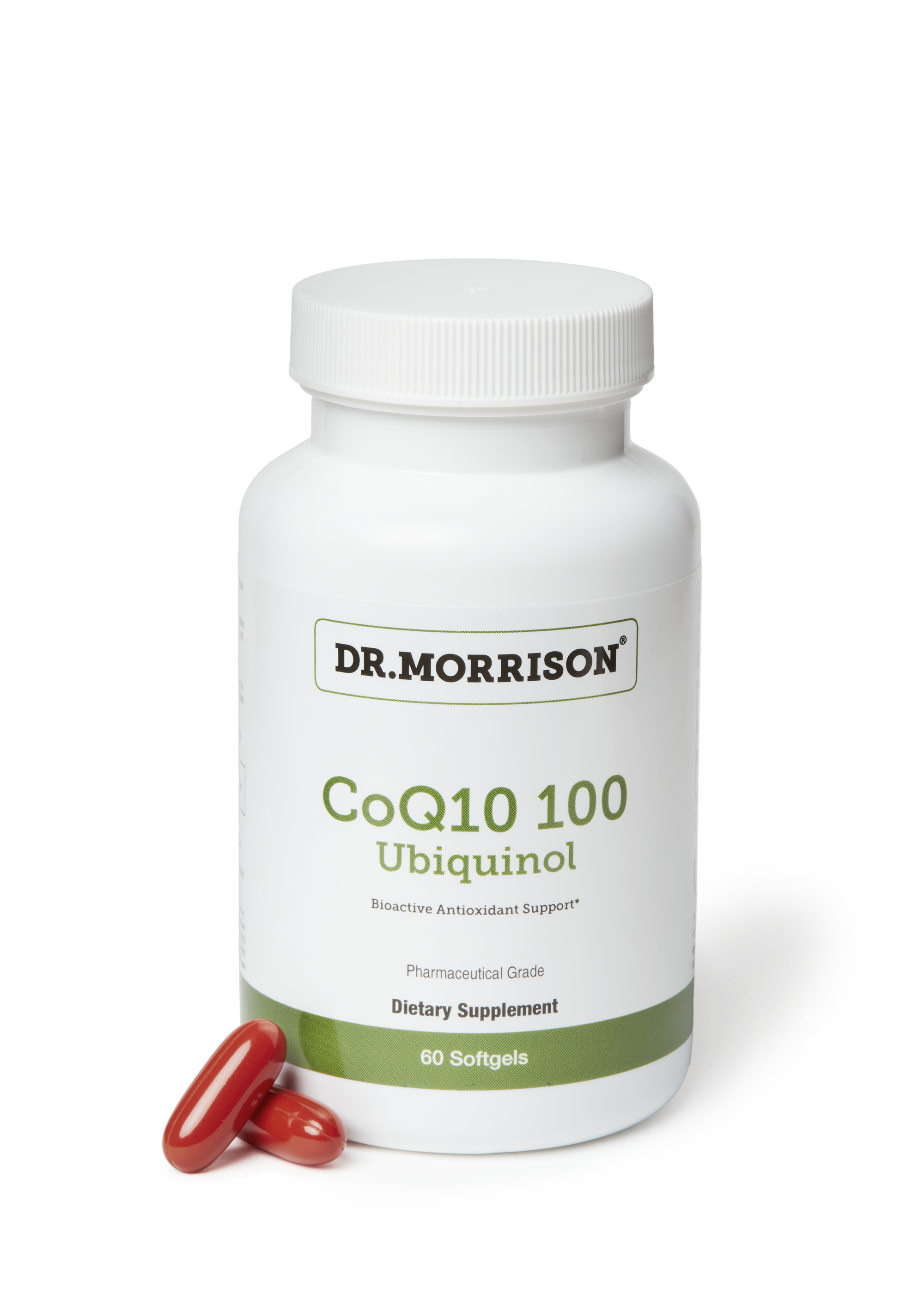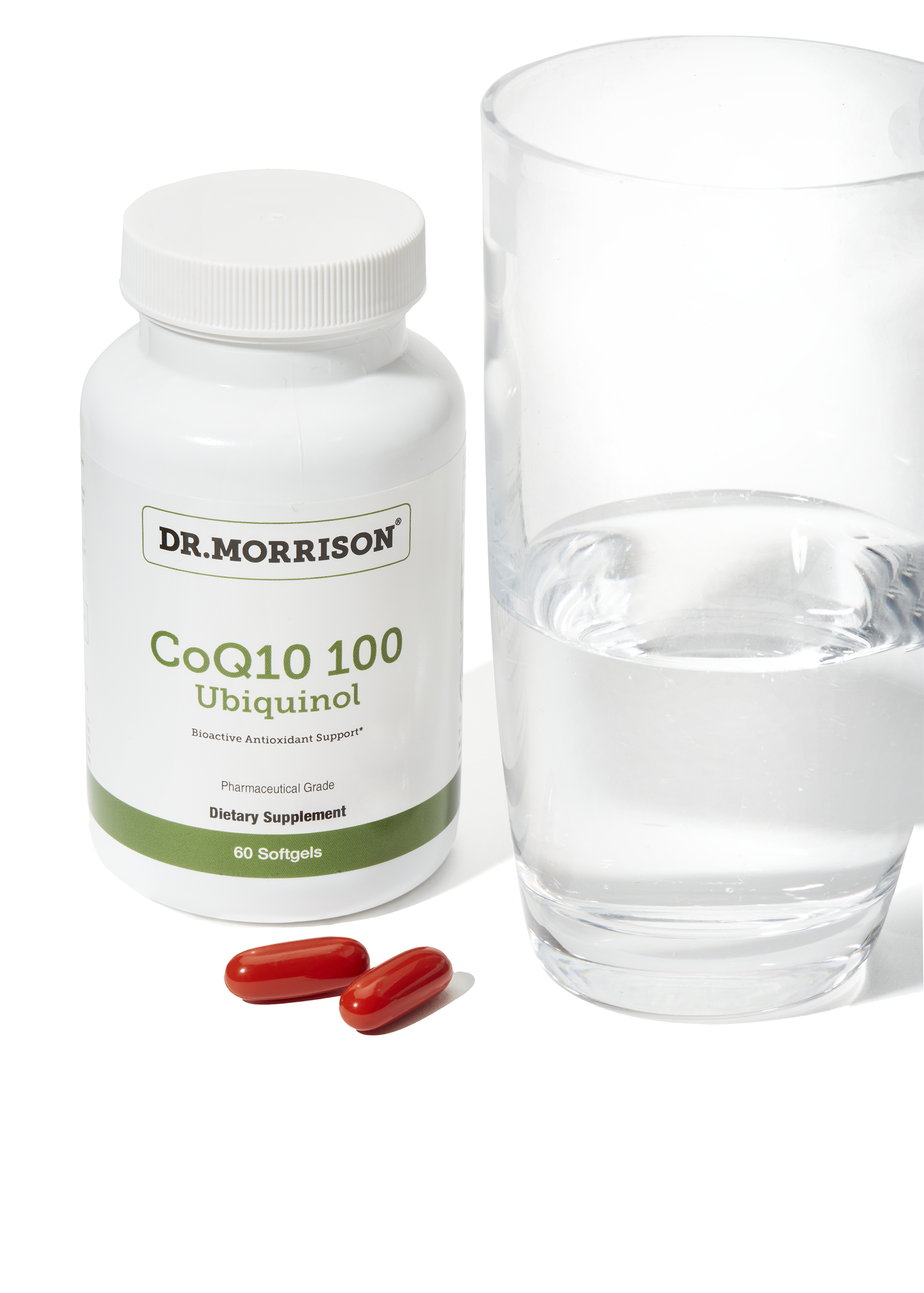CoQ10 Ubiquinol 100
$ 75.00
Size: 60 Softgels
Bioactive CoQ10 (Ubiquinol) is Antioxidant Support for Optimal Energy Metabolism and Cytoprotection*
Coenzyme Q10 (CoQ10, Ubiquinol) is the master mitochondrial antioxidant, protecting our fine-tuned mitochondrial energy production system. CoQ10 is necessary for the efficient transfer of electrons during cellular respiration, while also minimizing membrane lipid peroxidation and neutralizing free radicals and toxic superoxides.
Product Highlights:
- Supports Antioxidant Activity in Lymph, Blood, and Cell Membranes*
- Helps Regenerate Antioxidant Vitamins C and E*
- Neutralizes Superoxide and Other Free Radicals*
- Supports Optimal Muscle Function*
- Promotes Heart Health*
- Supports Mitochondrial Energy Production*
- Supports Athletes During Training and Recovery*
The regeneration of ubiquinone to the active form ubiquinol declines with age, particularly after age 40. Ubiquinol is typically chemically unstable and easily oxidized, but Dr. Morrison’s CoQ10 100 contains a patented, absorbable form of ubiquinol that maintains its structure and stability in the gastrointestinal environment.
The cholesterol-producing enzyme HMG-CoA reductase, which is inhibited by statin drugs, is central to CoQ10 production. Statins are known to deplete CoQ10 in some individuals, and supplementing with CoQ10 may reduce statin-related muscle symptoms.*[1] As a lipid-soluble antioxidant, CoQ10 also maintains the integrity of healthy cholesterol for the production of vitamin D, hormones, cell membranes, and brain tissue.
CoQ10 supports healthy heart function, and research has found that switching from ubiquinone to ubiquinol may generate higher levels of serum CoQ10 and better heart outcomes.2 Healthy antioxidant function is also necessary for both female and male fertility, which studies have shown CoQ10 may help support.3
*These statements have not been evaluated by the FDA and are not intended to treat or cure any disease.
This specialized, lipid-stabilized form of ubiquinol has enhanced bioavailability and stability in the gastrointestinal tract. Clinical research has demonstrated that this patented formula is efficiently absorbed and maintained in its active, reduced state in the bloodstream.4 In our experience, CoQ10 100 (Ubiquinol) is the most effective form of this important antioxidant, and a consistent favorite of our patients.
2 SOFTGEL PER SERVING
- Coenzyme Q10 (as ubiquinol) 200 mg
Other Ingredients: Medium-chain triglycerides, softgel (bovine gelatin, glycerin, purified water, and annatto in sunflower oil), ascorbyl palmitateS2, white beeswax, and sunflower lecithin.
FORMULATED TO EXCLUDE: Wheat, gluten, corn, yeast, soy, dairy products, fish, shellfish, peanuts, tree nuts, egg, GMOs, artificial colors, artificial sweeteners, and artificial preservatives
Take 1 softgel daily, or as directed by your healthcare practitioner.
Caution: Individuals taking medication should discuss potential interactions with their healthcare practitioner.
Background Previous studies have demonstrated a possible association between the induction of coenzyme Q10 (CoQ10) after statin treatment and statin-induced myopathy. However, whether CoQ10 supplementation ameliorates statin-induced myopathy remains unclear. Methods and Results PubMed, EMBASE , and Cochrane Library were searched to identify randomized controlled trials investigating the effect of CoQ10 on statin-induced myopathy. We calculated the pooled weighted mean difference ( WMD ) using a fixed-effect model and a random-effect model to assess the effects of CoQ10 supplementation on statin-associated muscle symptoms and plasma creatine kinase. The methodological quality of the studies was determined, according to the Cochrane Handbook. Publication bias was evaluated by a funnel plot, Egger regression test, and the Begg-Mazumdar correlation test. Twelve randomized controlled trials with a total of 575 patients were enrolled; of them, 294 patients were in the CoQ10 supplementation group and 281 were in the placebo group. Compared with placebo, CoQ10 supplementation ameliorated statin-associated muscle symptoms, such as muscle pain ( WMD , -1.60; 95% confidence interval [ CI ], -1.75 to -1.44; P<0.001), muscle weakness ( WMD , -2.28; 95% CI , -2.79 to -1.77; P=0.006), muscle cramp ( WMD , -1.78; 95% CI , -2.31 to -1.24; P<0.001), and muscle tiredness ( WMD , -1.75; 95% CI , -2.31 to -1.19; P<0.001), whereas no reduction in the plasma creatine kinase level was observed after CoQ10 supplementation ( WMD , 0.09; 95% CI , -0.06 to 0.24; P=0.23). Conclusions CoQ10 supplementation ameliorated statin-associated muscle symptoms, implying that CoQ10 supplementation may be a complementary approach to manage statin-induced myopathy.
Supplemental ubiquinol in patients with advanced congestive heart failure
Patients with CHF, NYHA class IV, often fail to achieve adequate plasma CoQ10 levels on supplemental ubiquinone at dosages up to 900 mg/day. These patients often have plasma total CoQ10 levels of less than 2.5 microg/ml and have limited clinical improvement. It is postulated that the intestinal edema in these critically ill patients may impair CoQ10 absorption. We identified seven patients with advanced CHF (mean EF 22%) with sub-therapeutic plasma CoQ10 levels with mean level of 1.6 microg/ml on an average dose of 450 mg of ubiquinone daily (150-600 mg/day). All seven of these patients were changed to an average of 580 mg/day of ubiquinol (450-900 mg/day) with follow-up plasma CoQ10 levels, clinical status, and EF measurements by echocardiography. Mean plasma CoQ10 levels increased from 1.6 microg/ml (0.9-2.0 microg/ml) up to 6.5 microg/ml (2.6-9.3 microg/ml). Mean EF improved from 22% (10-35%) up to 39% (10-60%) and clinical improvement has been remarkable with NYHA class improving from a mean of IV to a mean of II (I to III). Ubiquinol has dramatically improved absorption in patients with severe heart failure and the improvement in plasma CoQ10 levels is correlated with both clinical improvement and improvement in measurement of left ventricular function.




